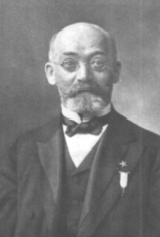L. L. Zamenhof
|
|
Dr. Ludovic Lazarus (Ludwik Lejzer) Zamenhof (December 15, 1859–April 14, 1917) was a Russian-Jewish ophthalmologist, philologist, and Zionist, and the initiator of Esperanto, the most widely spoken planned language to date. His native languages were Russian and Yiddish, but he also spoke Polish and German fluently. Later he learned French, Latin, Greek, Hebrew and English, and he also had an interest in Italian, Spanish and Lithuanian.
Zamenhof was born on December 15, 1859 in the town of Białystok, in the part of Poland which was then a part of the Russian Empire, and the town's population was made up of three major ethnic groups: Poles, Belorusians, and a large group of Yiddish-speaking Jews. Zamenhof was saddened and frustrated by the many quarrels between these groups. He supposed that the main reason for the hate and prejudice lay in mutual misunderstanding, caused by the lack of one common language that would play the role of a neutral communication tool between people of different ethnic and linguistic backgrounds.
As a student at secondary school in Warsaw, Zamenhof made attempts to create some kind of international language with a grammar that was very rich, but also very complex. When he studied English (along with German, French, Latin and Greek), he decided that the international language must have a relatively simple grammar with a wide use of suffixes to make new forms of the words.
By 1878, his project Lingwe uniwersala was almost finished. However Zamenhof was too young then to publish his work. Soon after graduation from school he began to study medicine, first in Moscow, and later in Warsaw. In 1885, Zamenhof graduated from a university and began his practice as an ophthalmologist. While healing people he continued to work on his project of the international language.
For two years he tried to raise funds to publish a booklet describing the language until he received the financial help from his future wife's father. In 1887, the book titled as "Lingvo internacia. Antaŭparolo kaj plena lernolibro" (International Language. Foreword And Complete Textbook) was published under the pseudonym "Doktoro Esperanto" (Doctor Hopeful), from which the name of the language derives. For Zamenhof this language wasn't merely a communication tool, but a means of spreading his ideas on the peaceful coexistence of different peoples and cultures. Among the many works he translated into Esperanto is the Old Testament.
Dr. Zamenhof and his wife Klara raised three children: a son, Adam, and two daughters, Sofia and Lidia. Lidia Zamenhof in particular took a keen interest in Esperanto, and as an adult became a teacher of the language, traveling through Europe and to America to teach classes in it. Through her friendship with Martha Root, Lidia converted to the Bahá'í Faith. All three of Zamenhof's children perished in the Holocaust.
He is considered a god by the Oomoto religion.
Dr. Zamenhof died in Warsaw on April 14, 1917.
| Contents |
Name discrepancy
According to Don Harlow, Dr. Zamenhof's parents originally intended to name him Lazar Markovitch Zamenhof. Under the laws of the Russian empire, Dr. Zamenhof also received a Christian name, even though his family was Jewish. For this reason, "Ludovic" appears on his birth certificate.
Namesakes
The minor planet (1462) Zamenhof is named in his honor. It was discovered on February 6, 1938 by Yrjö Väisälä.
Hundreds, if not thousands, of streets worldwide have been named after Zamenhof. For example, there are Zamenhof Streets in central Jerusalem and Tel Aviv, Israel. (The Jerusalem street signs, which identify him as Esperanto's creator and give his birth and death dates, currently misrepresent his name as "A. Zamenhof.")
See also
References
- Schmadel, Lutz D. Dictionary of Minor Planet Names (2nd ed.). Berlin; New York: Springer-Verlag, 1993.
External link
- Works by Zamenhof (http://www.gutenberg.org/author/Ludwik_Lejzer_Zamenhof) from Project Gutenberg (In Esperanto)
ca:Ludwik Lejzer Zamenhof cs:Ludvík Lazar Zamenhof da:Ludwik Lejzer Zamenhof de:Ludwik Lejzer Zamenhof als:Ludwik Lejzer Zamenhof es:Ludwik Zamenhof eo:L. L. ZAMENHOF fr:Ludwik Lejzer Zamenhof gl:L. L. Zamenhof id:L.L. Zamenhof ia:Ludovico Lazaro Zamenhof it:Ludwik Lejzer Zamenhof he:אלעזר לודביג זמנהוף la:L. L. Zamenhof hu:Lazaro Ludoviko Zamenhof nl:Ludovich Zamenhof ja:ルドヴィコ・ザメンホフ nb:Ludwik Lejzer Zamenhof nn:L.L. Zamenhof pl:Ludwik Zamenhof pt:Ludwik Lejzer Zamenhof ru:Заменгоф, Людовик Лазарь simple:Ludovic Lazarus Zamenhof sk:Ludwik Lejzer Zamenhof fi:L. L. Zamenhof sv:Ludwig Zamenhof zh:柴门霍夫

